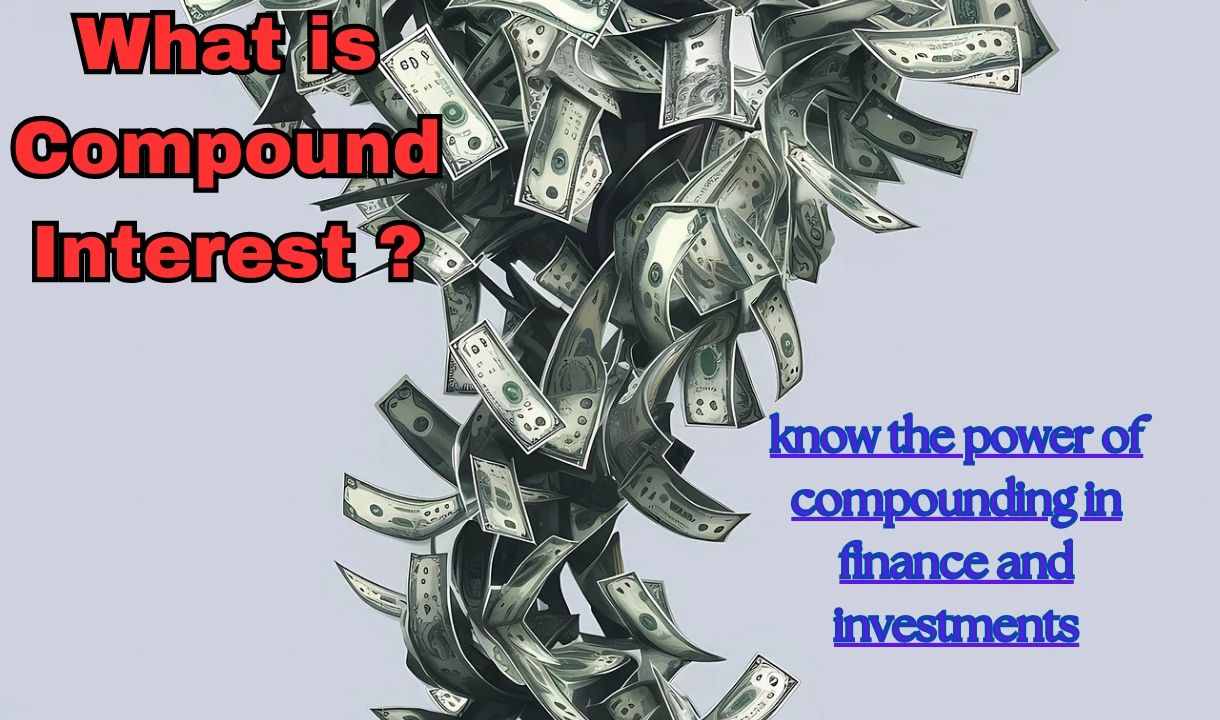What is Compound Interest and Why It Matters?
Compound interest is a fundamental concept in finance that can significantly impact your savings and investments. It’s often referred to as the “eighth wonder of the world” because of how it allows your money to grow exponentially over time. Whether you’re saving for a house, retirement, or just want to grow your wealth, understanding compound interest is crucial.
In this article, we’ll break down what compound interest is, how it works, why it matters, and how you can leverage it for your financial benefit.
What is Compound Interest?
At its core, compound interest is the process where the interest you earn on an investment is added to the original amount of money (the principal) to form a new total. This new total is then used to calculate future interest, which leads to exponential growth over time.
In other words, with compound interest, your interest is working for you — it’s generating more interest, and the cycle repeats. This makes compound interest much more powerful than simple interest, where interest is only calculated on the initial investment.
How Compound Interest Differs From Simple Interest
Simple interest is calculated only on the principal amount, whereas compound interest is calculated on both the principal and the accumulated interest. This difference is crucial because it directly affects the amount of money you can earn or owe over time.
Here’s a quick comparison between the two:
| Simple Interest | Compound Interest |
|---|---|
| Calculated only on the principal amount | Calculated on both the principal and accumulated interest |
| Amount of interest remains the same each year | Interest increases over time due to compounding |
| Suitable for short-term loans and investments | Ideal for long-term investments and savings |
The Formula for Compound Interest
To calculate compound interest, you can use the following formula:
Compound Interest Formula:
A = P (1 + r/n) ^ (nt)
Where:
- A = the future value of the investment/loan, including interest
- P = the principal investment amount (initial deposit or loan amount)
- r = the annual interest rate (decimal)
- n = the number of times the interest is compounded per year
- t = the number of years the money is invested or borrowed for
Example:
If you invest $1,000 at an interest rate of 5% per year, compounded annually for 3 years, the calculation will be:
- P = $1,000
- r = 5% or 0.05
- n = 1 (since it’s compounded annually)
- t = 3 years
Using the formula:
A = 1000 (1 + 0.05/1) ^ (1*3)
A = 1000 (1.05) ^ 3
A = 1000 * 1.157625
A = $1,157.63
So, after 3 years, your $1,000 investment will grow to $1,157.63, which includes $157.63 in interest.
Why Compound Interest Matters
1. Helps Money Grow Faster
Compound interest is powerful because it makes your money grow at an accelerating rate. The longer your money is invested or saved, the more interest it will generate. The effect is amplified when the interest is compounded more frequently, such as monthly or daily.
2. Rewards Long-Term Patience
One of the biggest advantages of compound interest is its ability to reward long-term investors. The more time your money has to grow, the more significant the effect of compounding. Early investors often see the most substantial returns, which is why starting to save and invest as early as possible is so important.
3. Can Work in Your Favor in Savings
When saving, compound interest allows your balance to grow steadily over time. By leaving your earnings in your savings or investment account, you will continue to accumulate interest on your original deposit and on the interest that’s been added to the account. This is particularly useful for long-term savings goals, such as retirement.
4. Can Work Against You in Debt
While compound interest benefits savers and investors, it can also work against you if you’re in debt. Many types of loans, including credit card balances, personal loans, and mortgages, use compound interest to calculate the interest you owe. This can lead to higher-than-expected payments if the interest compounds frequently and you don’t pay down the balance quickly.
How to Maximize Compound Interest
To get the most out of compound interest, there are a few strategies you can use:
1. Start Early
The earlier you begin saving or investing, the more time your money has to grow. Even small contributions can accumulate significantly over time thanks to compounding. For example, investing $100 each month into an account with a 6% annual return will grow much more over 30 years than the same amount over 10 years.
2. Reinvest Earnings
Reinvesting the interest, dividends, or any other earnings generated from your investments allows your money to keep compounding. When you withdraw your earnings, you miss out on this additional growth. For example, if you earn $50 in interest on an investment, reinvesting that $50 will allow you to earn interest on it the following year.
3. Choose Accounts with Higher Interest Rates
To maximize your returns, look for investment accounts or savings vehicles that offer the highest possible interest rates. Be sure to take into account the frequency of compounding as well—accounts that compound interest more frequently (e.g., monthly instead of annually) will yield higher returns.
4. Contribute Regularly
Regular contributions to your savings or investment accounts will help you build your balance more quickly. With compound interest, your total interest earned will increase as the principal grows, so contributing regularly will have a multiplying effect on your returns.
Compound Interest in Real Life
Compound interest isn’t just a theory—it has real-world applications in various financial areas, from savings accounts to investments and loans. Here are a few examples of how compound interest works in real-life scenarios:
Example 1: Saving for Retirement
Let’s say you start saving for retirement at the age of 25, contributing $200 each month into a retirement account that earns an average of 7% annual return, compounded monthly. By the time you’re 65, you would have over $400,000, assuming consistent contributions.
| Age | Amount Saved | Interest Earned | Total Value |
|---|---|---|---|
| 25 | $200/month | $0 | $0 |
| 35 | $24,000 | $19,328 | $43,328 |
| 45 | $48,000 | $61,032 | $109,032 |
| 55 | $72,000 | $126,455 | $198,455 |
| 65 | $96,000 | $303,494 | $399,494 |
Example 2: Paying Off Debt
Consider a credit card balance of $5,000 at 18% interest, compounded monthly. If you don’t make any payments for a year, your debt will grow substantially due to compounding.
| Month | Principal | Interest | Total Debt |
|---|---|---|---|
| 0 | $5,000 | $75 | $5,075 |
| 1 | $5,075 | $76.13 | $5,151.13 |
| 2 | $5,151.13 | $77.27 | $5,228.40 |
| 12 | $5,600 | $100 | $5,700 |
Common Misconceptions About Compound Interest
1. Compound Interest Only Applies to Savings Accounts
While compound interest is commonly associated with savings accounts, it also applies to investments, bonds, mortgages, and loans. Understanding how it works in different contexts is essential to making informed financial decisions.
2. Higher Interest Always Means Better Returns
While higher interest rates can lead to better returns, it’s important to consider the compounding frequency and any associated fees or penalties. For example, a 6% return compounded annually may be less beneficial than a 5% return compounded monthly.
Conclusion
Compound interest is an incredibly powerful tool that can significantly increase your wealth over time. Whether you’re saving for the future, investing in the stock market, or paying off debt, understanding compound interest can help you make smarter financial decisions. Start early, reinvest your earnings, and choose high-interest accounts to maximize your returns. The earlier you start, the more you can benefit from the magic of compounding.
FAQs
- How is compound interest different from simple interest?Compound interest is calculated on the principal and accumulated interest, while simple interest is calculated only on the principal amount.
- Can compound interest work against meYes, if you have loans or credit card debt, compound interest can cause the debt to grow faster if not paid off promptly.
- How often can interest compound?
Interest can compound annually, monthly, daily, or even continuously, depending on the financial product.
- What’s the best way to take advantage of compound interest? The best way is to start investing early, contribute regularly, and reinvest your earnings.







I am truly thankful to the owner of this web site who has shared this fantastic piece of writing at at this place.
I appreciate you sharing this blog post. Thanks Again. Cool.
I just like the helpful information you provide in your articles
I do not even understand how I ended up here, but I assumed this publish used to be great
Very well presented. Every quote was awesome and thanks for sharing the content. Keep sharing and keep motivating others.